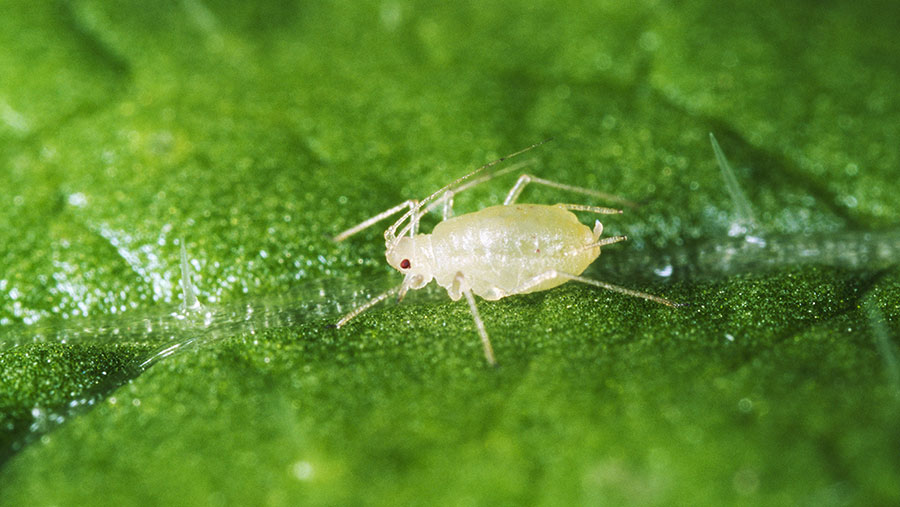Mild weather could see aphid threat to winter crops
 © Design Pics Inc/Rex Shutterstock
© Design Pics Inc/Rex Shutterstock Oilseed rape and cereal growers need to be vigilant and prepare for an insecticide spray as autumn aphid activity is being prolonged by mild weather.
Aphids can spread damaging diseases and field reports highlight that oilseed rape could be under threat, with crops in the South most vulnerable.
Researcher Mark Taylor at Rothamsted Research tells Farmers Weekly it is vital to be alert to the aphid risk this November until colder weather sees migration come to a stop.
See also: Aphid activity remains high in Kent
“It may already be the second week of November, but it is not a time for complacency. Vigilance is still needed for a while yet.
“Recent wet and windy weather will have restricted aphid flight but will not have done much to impede aphids on the ground, where they will be moving and reproducing happily in these temperatures,” he says.
Aphid numbers caught in suction traps have fallen in recent weeks due to a drop in temperatures, but crucially they are still above the 12C flight threshold.
Aphid reproduction and migration between plants will continue at temperatures of 3C and above.
Oilseed rape
The pests are being spotted in oilseed rape crops in the south-east and eastern England, with a noticeable peach potato aphid hotspot in the South West, reports Adas.
These peach potato aphids can spread turnip yellows virus (TuYV) in oilseed rape crops and can rob growers of up to 40% of their yields.
“Field reports I have seen suggest aphids are present in unprotected cereals, but at quite low levels at the moment, whereas winter oilseed rape aphid numbers seem a little higher and potentially carry a threat of turnip yellows virus,” adds Mr Taylor.
One site near Exeter was found to have the highest aphid numbers of anywhere in the UK right now, while AICC agronomist David Jones is reporting an “explosion” in numbers in his patch in the South East.
“We have hardly seen anything for weeks and suddenly on Monday we saw a really big increase in numbers.
“At the start of the week I looked at several crops in Sussex and Kent and most oilseed rape plants have aphids of both first and second generation on them.”
He explains that where there is a presence of a second peach potato aphid generation the risk of TuYV is heightened as these will migrate away from infected plants and spread the virus further afield.
Having seen no aphids in osr up to now, there's been a explosion in numbers in the last week. TuYV risk.
— David Jones (@CCCAgronomy) November 10, 2015
Mr Jones advises against using a pyrethroid spray to combat the aphids as resistance to the active is now widespread.
“We need to spray now where we are seeing high aphid numbers.
“Pyrethroids don’t work so growers should use one of the three alternatives.”
Foliar sprays Plenum (pymetrozine) and Biscaya (thiacloprid) can be used to control aphids in oilseed rape, while there is emergency authorisation for Teppeki (flonicamid) for aphid control.
An Adas site at Boxworth, Cambridgeshire, found 15% for oilseed rape plants infected by these aphids, says Steve Ellis, an entomologist for the organisation.
“We are finding increasing numbers of aphids in oilseed rape over the past two weeks, but we are finding very few in cereals,” says Dr Ellis.
However, there is no threshold for deciding when to use an autumn insecticide, and there is little way of knowing whether the aphids are carrying the virus.
Cereals
Seed treatments on early drilled cereal crops could now be running out of steam, meaning growers need to keep an eye on activity and the weekly AHDB aphid alerts to decide on a follow-up spray.
Evidence suggests that disease risks are low with only a small proportion of aphids entering cereals likely to be carrying barley yellow dwarf virus (BYDV).
